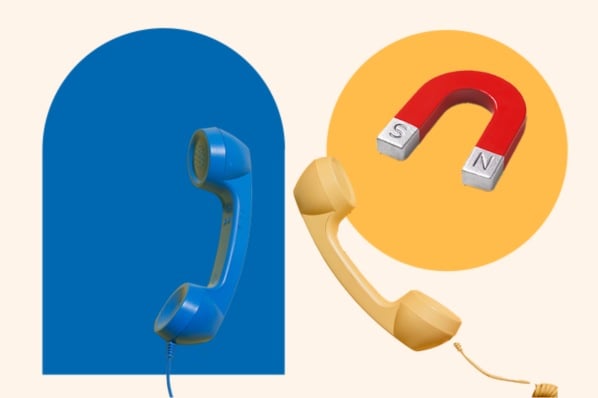

Legacy salespeople have always been too focused on closing the sale, and not focused enough on ensuring customer success. In days past, buyers had little recourse if oversold or under-serviced. But today, with the buyer's ability to publicly criticize poor service or product quality as well as go online and quickly find an alternative product or service, modern sellers must shift their focus towards ensuring customer success. Otherwise, buyer's remorse can quickly turns to seller's remorse.
So how do you ensure a positive customer experience -- or at least avoid a negative one? Sellers must take full responsibility for setting proper expectations during the sales process. Failing to set proper expectations is the biggest mistake salespeople make that leads to lost customers.
That's easier said than done when trying to make the sale. But it’s not impossible. Below, I've shared four steps I recommend every seller take to set proper expectations. I've also shared two stories that reinforce the importance of this four-step process.
If you are routinely dealing with pissed-off customers, these steps might save your career or business. If you'd like to seriously boost your productivity and profitability, adhering to these steps should help you have longer-lasting customer relationships and earn you significantly more referrals.
4 Steps to Correctly Set Prospect Expectations in the Sales Process
1) Define personas and identify good fits.
Your first step is to ensure you're focused on the right prospects. While this is important for all businesses, it's especially critical in a recurring revenue software-as-a-service (SaaS) business like HubSpot.
In our early days, we were hesitant to commit to one persona. Our product worked well for multiple customer profiles including very small business (VSB) owners as well as in-house marketers working at small and mid-market companies (SMB). But when the recession hit in 2007-08, our cancellation rate spiked among our VSB customers, many of them citing "business failure" as the reason. This forced us to put more energy towards our in-house marketer persona. We were lucky to have a fallback, but we may have avoided this scary situation altogether if we focused from the start on the persona that was a better fit for our service.
And you might not be so lucky if you don't deliberately define your ideal client profiles, and think about how to ensure their success. We've written extensively about defining personas, so I won't rehash that here. But if you haven't done so already, I highly recommend you grab the nearest marketer and this buyer persona template and get to work.
P.S.: If you're interested in reading more about HubSpot's persona decisions as you define yours (or pick the right ones to focus on), here's a fictionalized version of the scenario written as a Harvard Business Review case.
2) Make a checklist of disqualifiers.
There are some prospects you just can't help. Not every prospect should buy your product or service. That may sound shocking. But if you’re being honest, there are many reasons some prospects shouldn't buy from you.
They might be too big or too small, too beginner or too advanced. They might not have time to implement your solution or not enough time to wait to see ROI. They might have standards you can't match, or your product could be overkill for their simple needs. In short, your product or service just might not be the right one for their job.
Sellers who realize that signing a bad customer costs them more than it makes them take on the responsibility of determining fit. They know it's their job to figure out why a prospect shouldn't buy from them as much as they need to figure out why one should. They’re not afraid to disqualify prospects who won't be successful in the long run.
In the early days of HubSpot, small business customers purchased our software and training program with the best intentions of learning and implementing inbound marketing for their business. But inevitably, for some businesses, things got in the way of them doing the work required to be successful.
After studying common cancellation reasons, we discovered three factors that prevented customer success. We called these the three C's: Content, Conversion, and Commitment [of time]. If you became a customer back in the day, you might remember getting a bit of a lecture from one of our salespeople that went something like this, "Let's not do this unless you're really ready. You must be committed to doing your internet marketing for at least 15 hours per week. You must be focused on generating conversions (e.g., leads) not just traffic. Finally, you must be willing and able to write quality content. Do you think you can handle all of that?"
As a salesperson, you might read that and say to yourself, "That's a sure-fire recipe for turning away prospects." And we certainly got some pushback when we rolled this out to our sales team. But the results were overwhelmingly positive. Not only did we scare away very few prospects, our honesty earned us respect from many customers. This was especially refreshing for prospects during a time when search engine optimization hucksters were promising riches from page one Google rankings they claimed they could produce overnight.
While most salespeople love the thrill of closing a deal, signing on the wrong customer often does more harm than good. To avoid this, make a checklist of disqualifiers and don’t deviate from them. You might even be able to determine if a prospect is qualified before you ever call, and in those cases, don't bother calling.
3) Discuss what a successful relationship looks like.
Most sales experts will tell you that it’s bad practice to sell against yourself by bringing up reasons a customer won't be successful. That might have been true when sellers had all of the control and buyers had few alternatives. But in today's seller-beware world, I completely disagree. Long-term trust is far more important than short-term sales. You can always get sales and referrals if you have trust, while poorly sold deals lead to distrust and a negative reputation.
At HubSpot, when we disqualified using the "three C's", it actually sounded a bit more tactful than the example paragraph I included above. In reality, we spent time educating prospects as to why the three C's were important. For example, before we told them they needed to be focused on lead generation conversions instead of just traffic growth, we'd ask them why they wanted to grow traffic in the first place.
It sounded something like the following:
Prospect: I'm trying to figure out how to get more website traffic.
Salesperson: How much traffic do you have now?
Prospect: About 2,000 visitors per month.
Salesperson: What do you hope your visitors do when they get to your website?
Prospect: I'd like them to reach out to talk to us about our services.
Salesperson: How many leads do you get per month from your website now?
Prospect: We don't measure it very well. But, I'd guess it's about five leads per month now.
Salesperson: We can talk about growing traffic, but I might have an easier way to help you. Would you be interested in learning about how you could generate more quality leads from your existing traffic?
Prospect: Yes.
Salesperson: There are a few steps to it that I can walk you through. But, before we do that, let me understand your goals a bit. If you do lead generation on your website differently, it should not be difficult to get at least 2% of your traffic to convert into qualified leads. So that would be closer to 40 leads per month. How would that impact your business?
Prospect: That would be game-changing for us.
Salesperson: I imagine it would. Do you think that'd be easier than growing your traffic to 16,000 visitors?
Prospect: That certainly does sound easier.
At some point, we'd walk them through exactly how they could generate leads more effectively. Many companies do this effectively now. But, in 2008, only a few knew about this approach, let alone knew how successful it could be.
My main point of telling this story is to impress upon you that prospects don't usually know best. This isn’t a knock on their competence -- it’s a function of practice. It is your job as a salesperson to show your prospects what a successful relationship looks like. They may have never hired a company like yours, or if they have, they may have gone through a similar buying process only a few times. You and your company, on the other hand, have most likely gone through the selling process hundreds or thousands of times.
Despite prospects having ample information at their fingertips these days, you're still in a much better position to define what a successful customer relationship looks like. So, learn how to have the conversation.
4) Ask your customers if they are happy.
This one is obvious, but it's frequently overlooked. Most of the time, salespeople are so focused on what's next -- next month's quota, the next new customer, the next promotion -- that they forget to make sure the last customer was satisfied. Salespeople forget to check in to make sure expectations were met -- or hopefully exceeded.
This leads me to a more recent story that demonstrates what happens when salespeople don't follow the four pieces of advice above.
Why I Fired My Snow Plow Company
We recently purchased a new home with a fairly large driveway; about 10 car lengths in total. Sans snowblower, we hired a snow removal service. After repeated late arrivals, horrible expectation setting, and a threatening note, I decided to fire the company.
Before we hired them, though, we contacted a few different snow plow companies. We hired these guys because they were the most responsive. To give us a quote, a young man (who I later realized was the kid operating the shovel) came out to inspect our driveway.
It was clear he wasn't there to close the deal. He simply asked enough questions so that the owner could come up with a quote back at the office. He asked me what needed to be cleared: The driveway? The cars? The sidewalks? He asked if we wanted salt. In effect, he was figuring out our scope of work so the company could provide a quote. To be fair, this was better than anyone else. Most companies didn't even get back to us.
When the first storm finished, hours went by … and no news from them. So, I started shoveling. They showed up when I was halfway done and finished the job. We paid their full bill promptly.
After the second storm, I had actually finished shoveling by the time they got there. Pretty pissed off, I waved them on. I yelled, "You're too late!" but I can't imagine they heard me as the driver barely pumped the brakes. No bill came.
The third storm came in the evening, so they showed up as I was just getting started in the morning. I helped do some shoveling as one guy shoveled and the other snowblowed most of the driveway. At this point, through some conversation with them, I found out that we were near the very end of their route, as I suspected. We paid their full bill promptly again.
In the most recent storm -- the heaviest of them all so far this winter -- my wife emailed to ask when they would be arriving at our house, but all we got was a vague “they’re on their way.” Five hours after the storm was over, I finished the job and emailed saying there was no need for them to come. There was a clear pattern here, and I was unsatisfied.
That's when I received a rather direct note.
Peter -- after a prior storm, the guys told me they came by and you waved them on because you had already cleared the driveway yourself. This past storm you cancelled as they were approaching your street. We cannot continue to provide you services if we are merely providing backup. Schedules and travel routes are optimized per the client lists and requirements. It costs time and money to go to your property only to not be permitted to provide agreed services.
I can offer three alternatives to what has been occurring: 1) I am happy to allow you to cancel your agreement without any penalty; 2) there is a standard fee for each storm ($50) whether or not you use our services if you do not provide a cancellation notice within three hours after the storm starts; 3) on-demand snow removal, for which I will provide you a different pricing structure.
Please let me know what you think.
To which I replied:
We'll take option #1.
If you ever have a route that starts in our area, let us know. But I plan to find someone who will arrive more promptly after a storm is over.
Thanks.
And his response:
I understand, and am happy to cancel our service agreement.
A perspective perhaps for your interest (or not) -- we set up the routes to meet individual client requirements, some of which come at the last minute. This past storm we had a scare where a client needed us to clear so an emergency vehicle could gain access to her home. Another has therapy appointments on Mondays and must be able to get out of her driveway by 8 a.m. Sometimes someone will tell us that they must leave for a doctor appointment by 10 a.m … etc. Some have requested clearing to allow them to leave for work by 7 a.m.
As in most businesses, a given business model may or may not be a good fit for a client, and I am sorry that our approach cannot meet your needs. I hope you arrive promptly at another approach.
Best wishes.
While his language is professional, his approach to selling is far from it. Also, he lost a customer that he could have made happy with just a few simple questions. He bypassed each of the four steps above.
Step by step, here's what he could have done do keep me as a customer. Perhaps this can provide a template for you to avoid the same mistakes.
1) Define Personas
Their ideal client profile seems to be someone who needs their service much more than I do -- someone with medical needs or who needs to be in the office every day at a specific time. Clearly, they prioritize these people, so perhaps that should be their sole focus.
Most likely, though, a small town plowing service cannot survive on emergencies alone. In fact, I'm guessing every job they do increases profit quite considerably since they probably need to amortize heavy upfront investments in equipment.
While I never thought of them as backup, I don't mind shoveling the driveway. It's good exercise. Plus, when I get started, I don't like to stop until the job is done. Maybe it's a bit of a stretch to suggest that a plowing service should define multiple personas, but my guess is there are quite a few people that might benefit from a "backup" plan. They might even pay for it just like I pay a monthly fee for priority service in case our heater breaks down. I would definitely pay more if there were a premium plan that offered me priority service.
I see three potential personas: Emergency Eddie, Backup Billy and Impatient Priority Pete. (In case you didn't know, the first rule of personas is that they must always have a descriptor and a first name that starts with the same letter.)
2) Identify Disqualifiers
When we initially met for a consultation, there was no mention of disqualifiers. I was not asked about my ability to shovel the driveway myself. There was no mention of a cancellation policy or a required payment per storm. This was not part of our conversation, nor was it part of the contract. When they came out to give me a quote and I said that I would clean off the cars, shovel the walkways, and put my own salt down, perhaps they should have realized I might be Backup Billy or Priority Pete and brought up these disqualifiers.
A simple explanation of their routes before we signed the contract probably would have solved the entire issue. Something like, "You are closer to the end of our route and we always prioritize emergency jobs over non-emergencies. Is it okay if we arrive four to six hours after a storm is over?" probably would have elicited a response from me to the effect of, "Is there any way I can cancel the service if I do the shoveling myself?"
3) Discuss Criteria of a Successful Relationship
Besides being unwilling (or unprepared) to disqualify me, they made no attempt to define what a successful relationship looked like. Clearly I pissed them off by shoveling my driveway myself. From my perspective , where they really screwed up was in not communicating that I'd be at the end of the route -- or how they prioritize their route based on need or requests. To me, waiting five hours to get snow removed from my driveway isn't acceptable. But if I could have requested priority service when I needed it or had the option to cancel when I didn’t, I'd probably still be a customer.
Defining personas and creating a list of disqualifiers are necessary steps to prepare for exploratory conversations with prospects. And during that conversation, it's critical to define what a successful relationship sounds like.
Here's the conversation the plow guy should have had with me:
Salesperson: Hey Pete. I understand you're looking for a plowing service. Are you new to the neighborhood?
Me: Yes. We just moved into the house in May. We would like to hire someone to help us with plowing.
Salesperson: Welcome to town, Pete. Can I ask you a few questions to figure out how to best serve you?
Me: Yes, of course.
Salesperson: Great. Let's first get a scope on the job. What were you looking for us to do? Just the driveway, clean off the cars, the sidewalk? Anywhere else around the house? Do you want us to put down salt? [These were the questions they did ask.]
Me: I will take care of cleaning off the cars and putting down salt. But I would like you to do the driveway and the walkways.
Salesperson: Okay. Would you like us to use the plow or the snowblower for the driveway? I think the snowblower would be better given your pavement is uneven. [We didn't have this conversation until after the first time they plowed.]
Me: I'm not too worried about it. I can shovel what the plow misses. I just need someone to clear it when there is a big storm.
Salesperson: Okay. No problem. Our fee will be $60 per storm. Do you have any questions for me?
Me: I don't think so. Should I be asking any more questions?
Salesperson: I have a few more for you just to make sure this is the right fit. But before I ask them, assuming that we are a good mutual fit, are you prepared to make a decision and sign our contract today?
Me: Yes. I'd like to have this crossed off the list.
Salesperson: I understand that. Okay if I ask a few more questions to make sure we have all of the T's crossed and I's dotted? [Note: They didn't have any more questions. They stopped here and sent us a quote.]
Me: Yes. I appreciate thoroughness.
Salesperson: We prioritize emergencies and health-related issues first. For example, we had one client call us in the middle of the storm as an ambulance was heading to her house. If you have an emergency, you can call us at 555-5555.
Me: Thank you. That gives me peace of mind.
Salesperson: Then, we try our best to solve for other requests. For example, we have a doctor that needs to get out of her driveway every morning at 7 a.m. to get to the office. Will you need that level of service?
Me: No. We'll be fine. We can park at the end of the driveway, I can shovel if needed, and we have a four-wheel drive vehicle. Plus, I can work at home when there is a storm.
Salesperson: From there we try to optimize based on a route so that we're not driving back and forth across town. Unfortunately, you're probably going to be closer to the end of our route. Will that be an issue?
Me: Probably not. For most storms, I'll clean off the car and probably start shoveling the driveway anyways. I don't mind the exercise. I view this service as backup and something to help with bigger storms.
Salesperson: Well, we'll probably be here four to six hours after the storm is over. If the storm ends at night and you're sleeping, you’ll wake up to a clear driveway. But if it ends in the evening after you're done working, do you still going to want us to come or do you think you'll do it yourself?
Me: I'd still want you to come.
Salesperson: Okay. Well, we also have a cancellation policy that I should let you know about. If you don't need our service, we need you to notify us no later than three hours after the storm starts. When you give us warning, it avoids us driving over to your house, wasting gas and time. In these cases, we won't bill you. If you'd like us to come no matter what, but you cancel when we arrive, we will bill you only $50 for the lost time and materials. Is that okay?
Me: Yes. That seems fair. A bit steep of a cancellation fee, but I don't mind calling if I don't need your service.
Salesperson: One other option would be to call us when you need service. We can’t guarantee capacity and this fee would be higher given the extra cost of coordination.
Me: I’ll go with the $60 per storm plan and call you in time if we don’t need service.
Salesperson: Okay. Sounds great. Here's our agreement. Do you have any other questions before signing?
As you can see, this conversation covered all of the issues that arose. I still would have signed the contract.
4) Gauge Customer Happiness
Lastly, the biggest mistake they made was failing to ask an adequate number of questions about what would make me happy and our relationship successful. From the start of the relationship to the end, it was all about them and their needs instead of my needs or my satisfaction.
The email that triggered me to cancel the service should have never been sent. First of all, it should have been a phone call. Second, it should have started with, "Are you happy with our service when we are able to provide it? Is there anything you'd like us to do differently?" If they listened to me and then brought up their issues, I would have understood and I imagine we could have worked something out. Those two simple questions would have prevented the cancellation. If I was simply asked my thoughts before I was told about their problems, I would have reacted very differently.
Stop Losing Customers Because of This Simple Sales Mistake
Hopefully, whether you sell software, snow plowing services, or something else, these two stories can help you avoid losing customers. This four-step process will help you set better expectations leading to happier customers and successful long term relationships.
Acquiring customers is expensive, but so is losing customers. Poorly setting expectations about what a successful relationship looks like is a simple mistake that costs you customers. Follow this four-step process to avoid it in your career and your business: define your personas, create a list of disqualifiers, discuss what a successful relationship looks like with your prospects, and always ask your customers how they are doing.
Happy, successful customers will not only stick with you for a long time, but they will also be your best source of best fit customers, as they know exactly how to spot and refer people just like themselves.

![How to Use BANT to Qualify Prospects in 2024 [Expert Tips]](https://blog.hubspot.com/hubfs/bant-questions-6606f7b6c0d9e.webp)



![21 Signs Your Buyer Is a Poor Fit [Sales Process Checklist], According to HubSpot's Former Sales Director](https://blog.hubspot.com/hubfs/Bad%20fit%20checklist.jpg)




